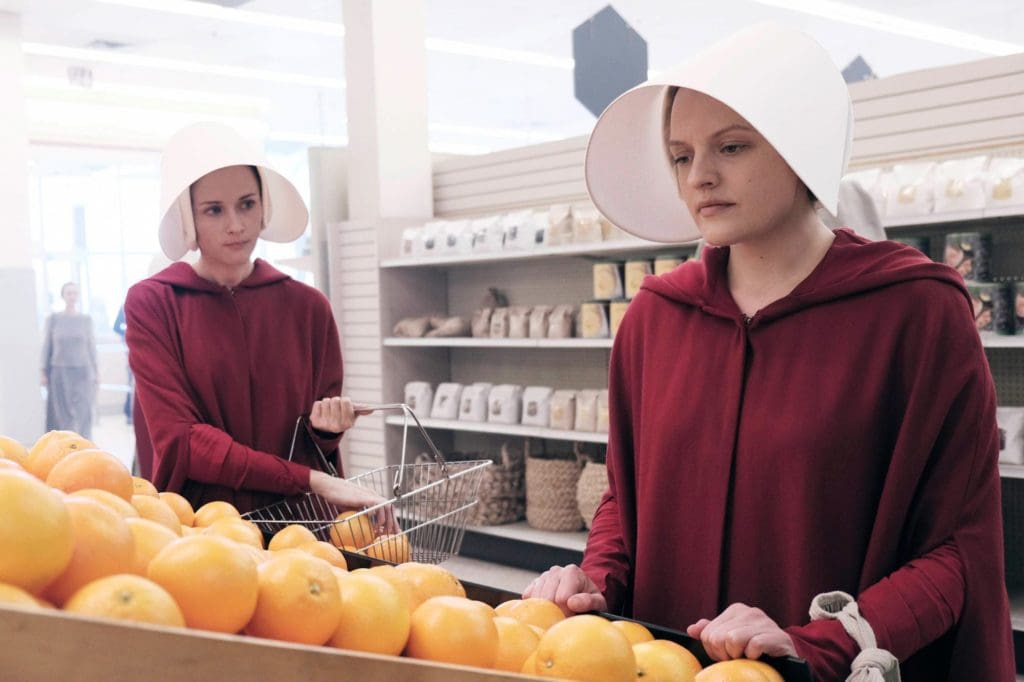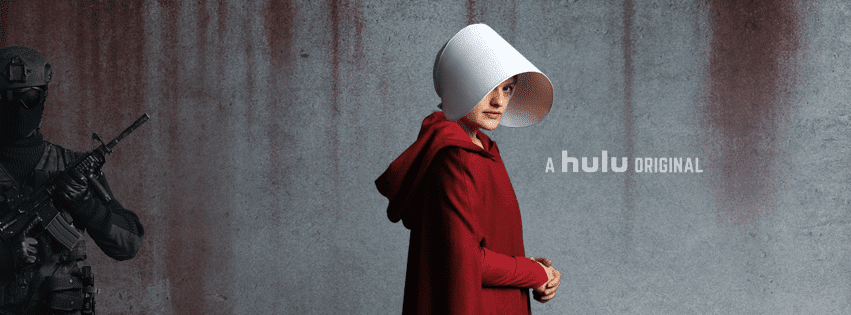Disclaimer: Before I plunge into a glowing review, it must be noted I know Madeline Brewer, who plays Janine in the series, through my boyfriend who is her first cousin. (It should also be noted that I loved her in Orange is the New Black way before I even knew anything about her, much less my boyfriend.)
Much has been said about this show, Margaret Atwood (who I love and whose work continuously blows my mind), the creators and directors, and the actresses and actors over the last few months.
Numerous articles have been written about the book’s feminist ideology and what it means in this current political climate. The show holds some eerie, scary comparisons to our present day. Much to Atwood’s chagrin, many people (myself included) take to calling her a seer, as her books (that I have read) seem to predict what is happening now and may happen in the near future. She, however, thinks otherwise as The Handmaid’s Tale specifically was written with a historical context. Much of what happens in the story has happened somewhere at some point in time. Instead of predicting the future, Atwood is reminding us that history repeats itself and the patterns are visible to anyone willing to look.
To see The Handmaid’s Tale first episode, growing up in the time and place that I have, was shocking to me. Even though it seems like this might be what we’re coming to, I have to remember that there are people who are currently experiencing a similar situation to the world of The Handmaid’s Tale. Extremism and radicalism of religion is not new. It is the most basic bitch of ways to enact total control, purge the world of undesirables, and create a caste system to benefit a select few. The Handmaid’s Tale is a poignant story but it isn’t America’s alone.

The first episode of The Handmaid’s Tale was created lovingly and thoughtfully. It was everything I hoped it would be and more. I cried about twenty minutes in and for those that know me you’re probably thinking, “It took you that long?” Yeah, I know.
It was an intentional build up, like a Pepsi and Mentos experiment gone terribly according to plan. I, and almost every viewer, knew at least a small kernel of what this show is about. It is going to be bad and bad things will happen and bad people are in power. So when it starts off with a speeding car, police sirens and Elisabeth Moss clutching her terrified daughter to her side, I wasn’t fazed — because horrific, scary things happening is the selling point of this story.
What started the sobfest was Janine’s scene at The Red Center where she confesses her gang rape. Bruce Miller and Reed Morano wrote and shot the scene in a way that made me think of support groups and on a lesser scale sleepovers with girlfriends and late night wine induced heart to hearts. These positive things offer comfort and support and kind words. Instead the other Handmaid’s, at the behest of Aunt Lydia (Ann Dowd,) point and chant that it is all Janine’s fault and it was God teaching her a lesson. This moment completely and irrevocably intensified and centralized the hell these women (and all the people in this world) now live in. If I didn’t already believe The Handmaid’s Tale was going to do justice to it’s source material, that scene proved it.
On the other end of the spectrum, Ofglen (Alexis Bledel) helps to amplify Offred’s hope for survival. I want to give big, big ups to Alexis Bledel. I only know her as Rory Gilmore, the bright eyed, fast talking, coffee drinking Yale grad. She’s severely different in this. As Ofglen, her face has taken on a darker, patchier, more haggard look. She delivers her lines in a measured, serious tone, eviscerating the single character type cast I have for her in my head. Ofglen and Offred forge a tenuous friendship near the end of the episode. I am looking forward to seeing how this relationship will play out and I hope to see much more of Bledel on screen.
Samira Wiley, also, showcases her versatility as an actress. In Orange is the New Black she was happy and upbeat and goofy. Even in dark times she seemed to look for the positive. And yet as Moira, Wiley convincingly plays cunning and hardened. Moira is scrappy and cagey which Wiley pulls off effectively.
Obviously I have to touch quickly on Elisabeth Moss as she plays our protagonist, Offred. Moss plays Offred exactly how I read her in the book. This was a masterfully done series and masterfully done episode. Elisabeth Moss pulls off the narration so well because she is Offred. She imbues every word, every action, every glance and every deadened look through the camera with a deep fear she struggles hard to cover and an ache for survival that is just barely holding on.
There is something to be said about the resumes of all the women cast in this show. They have all played iconic, kickass women who are imperfect and blemished. Not one among them can claim to not have problems or flaws. Even with that, their characters are beloved and well known which makes them, and the actresses that portray them, important.
The Handmaid’s Tale premiere episode was an excellent hour of television and I am excited to continue on with the rest of the season. Bruce Miller wrote something incredible that paid the perfect homage to Margaret Atwood’s book. I hope the series leads to a wider discussion for the people that need to have a discussion and not just the people who have already been having the discussion about human rights and oppression and is extremism, even if committed by white Christians, still terrorism (because yes, it is.) I don’t want people to watch and say, “Well, that was good but it could never happen here” because the second that people sleep and rest on their laurels, is when this happens here.
So watch the show. Be entertained. Keep your mind open. Have a fighting spirit and never stop resisting. Nolite te bastardes carborundorum.
Rating: 10 out of 10
Handmaid’s Tale is currently streaming on Hulu.
https://www.youtube.com/watch?v=PJTonrzXTJs


